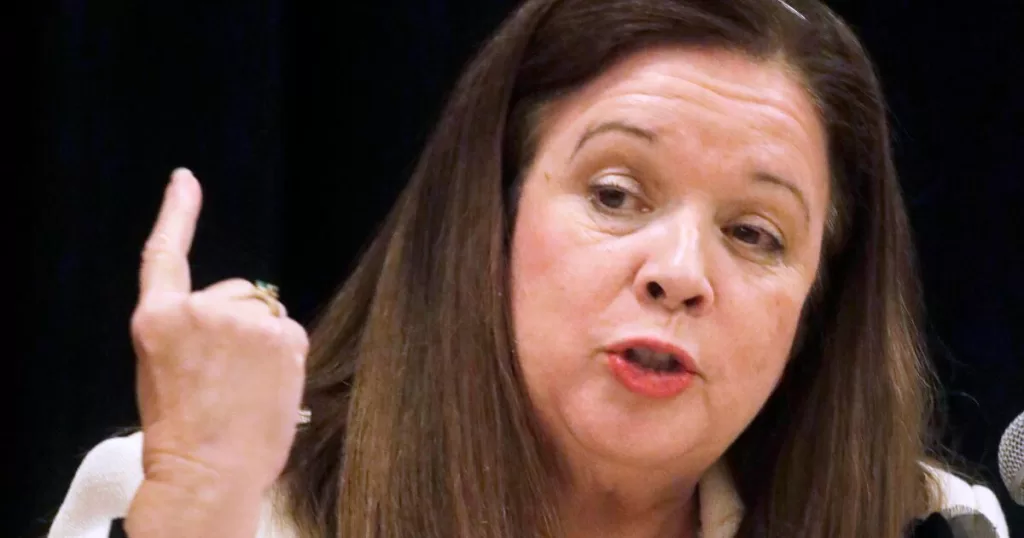Michelle McGinnis, who until April was head of the city attorney’s criminal branch, alleged in the claim that Feldstein Soto based some decisions about who should be prosecuted on “personal relationships” or “perceived political gain.”
At one point, Feldstein Soto told McGinnis that she wanted the office to stop prosecuting corporate defendants, according to the claim. At another, Feldstein Soto singled out a protester for prosecution without following proper law enforcement procedures, the claim stated.
“When McGinnis objected that the office was both legally and ethically prohibited from making such prosecution decisions, she was subjected to a series of adverse employment actions and ultimately placed on administrative leave, removed from the office, and prohibited from further contact with office colleagues and employees,” attorney Matthew McNicholas, whose firm is representing McGinnis, wrote in the claim.
McNicholas said in a statement that McGinnis was also subjected to a “barrage of retaliatory actions” after she reported various other issues within the office, including mishandling of grant funds, discriminatory treatment of coworkers and “inappropriate alcohol consumption” in the workplace by Feldstein Soto and Denise Mills, a chief deputy city attorney.
On April 22, McGinnis was escorted out of the building in front of her colleagues, forced to hand over her laptop and placed on administrative leave, according to the claim.
McGinnis, first hired by the city in 1993, is seeking at least $1 million from the city, saying she sustained economic and non-economic damages, as well as harm to her reputation.
Aides to Feldstein Soto did not immediately respond to inquiries from The Times about the allegations spelled out in the claim, which is the first step before the filing of a lawsuit.
The claim could pose a serious political threat to Feldstein Soto, who was elected in 2022 and is not yet halfway into her first four-year term. She has already faced criticism over her decision to sue a journalist who obtained records on Los Angeles police officers and her push for legislation that would weaken the state public records law.
The city attorney’s office has dual roles, representing the city in a wide array of legal matters while also prosecuting misdemeanor crimes.
In her claim, McGinnis said she repeatedly heard Feldstein Soto express a desire to stop prosecuting corporate defendants — saying on several occasions that “a single misdemeanor” was the downfall of the Arthur Andersen accounting firm. McGinnis said she responded by providing a memo to Feldstein Soto explaining the “appropriate” legal basis for charging corporate defendants, to ensure the city complied with the law.
In another incident, according to the claim, Feldstein Soto directed McGinnis to prosecute a person whom Feldstein Soto believed she had seen in a video of a protest late last year outside the Westside home of “an Israeli lobbyist.” The claim did not identify the lobbyist or the person at the protest.
McGinnis said she responded by telling Feldstein Soto that law enforcement needed to investigate first and warned that taking immediate action would “compromise any ultimate prosecution,” according to the claim.
Feldstein Soto also made statements indicating that certain cases should not be prosecuted because they “would adversely affect [her] political career,” the claim alleged.
McGinnis is one of several employees in Feldstein Soto’s office who have filed claims alleging they faced retaliation for reporting misconduct.
In January, Deputy City Atty. David Bozanich filed a claim seeking $1 million in damages, saying that higher-ups retaliated against him after he reported that the office was violating federal policies on storing digital evidence. Bozanich said he was punished for engaging in “protected whistleblower disclosure activity.”
In February, the city attorney’s office denied Bozanich’s claim. He still has several weeks to file a response.
In April, another employee in Feldstein Soto’s office filed a legal claim, alleging he was retaliated against for identifying what he said were acts of racial discrimination. Sean C. Tyler, an administrative coordinator, accused the office of engaging in “disparate treatment of people” in hiring and promotions.
Tyler, who also described himself as a whistleblower, is seeking $10 million. He said in his claim that he was hired to work in the office’s data center on Jan. 25, only to have the job offer rescinded roughly two weeks later — after he had already accepted the position and started work.
In his filing, Tyler said he also voiced concerns that Feldstein Soto’s office was out of compliance with laws regulating access to sensitive law enforcement information.
Tyler, who still works in the city attorney’s office, confirmed to The Times that he had filed a claim. He declined to provide further comment.
Of the three claims, the filing by McGinnis is by far the most detailed. Her lawyers said that in February, she emailed Feldstein Soto a draft memo on “Conflicts of Interest and Ethical Considerations,” which was aimed at ensuring compliance with ethical rules.
Feldstein Soto initiated a meeting with McGinnis a few days later, according to the claim. During that meeting, Feldstein Soto began “pounding on the desk in a rage,” screaming and “making statements to the effect of ‘how dare you accuse me,’ ” the claim stated.
McGinnis was criticized by higher-ups in front of her colleagues, accused of being incompetent and subjected to heightened scrutiny, according to the claim.
McGinnis also alleged that on one occasion, Feldstein Soto instructed her to “dismiss a corporate officer from a criminal case.” In the claim, McGinnis did not name the corporate officer but said she believed Feldstein Soto gave the instruction because she had an existing relationship with the officer or the corporation.
